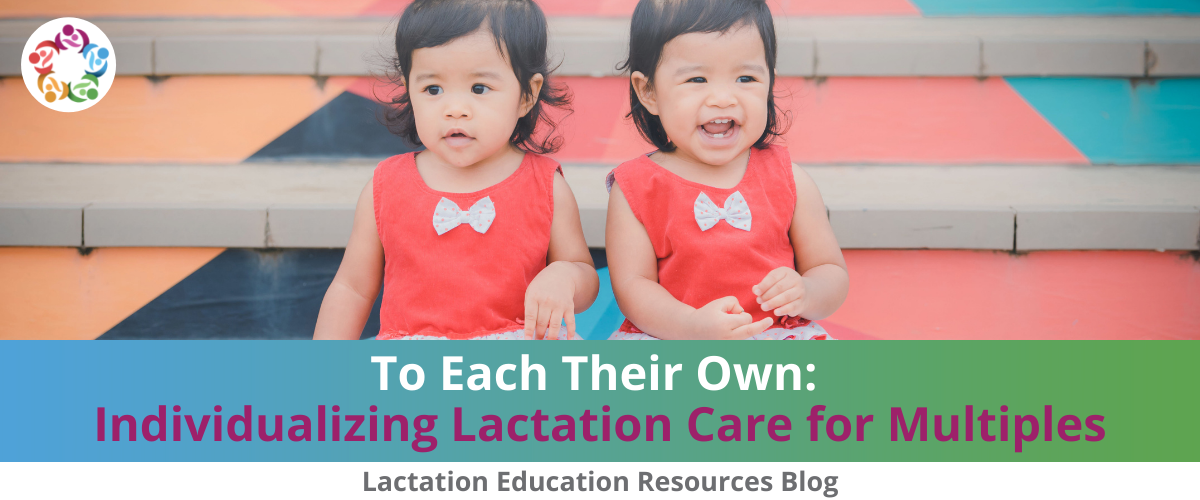To Each Their Own: Individualizing Lactation Care for Multiples

When you come into the world as a multiple, you’re used to sharing. But even if you’re a multiple, some things should be your very own! Among these is individualized care from your lactation support professional.
Each baby in the set of multiples is unique and has unique needs. When you’re supporting a family with multiples, it’s important to keep this in mind.
You catch the hints that might mean an incorrect latch, tethered oral tissues, a milk supply problem.
Everything from your initial assessment to your care plans (one for each baby) to your follow ups should carefully consider each baby as an individual.
With that in mind, here are six things every baby in a set of multiples needs to be their very own.
1) Their own pace and expectations. From how quickly they gain weight to how fast they learn to latch (and later, to how fast they walk, talk, and read), every baby in a set of multiples deserves to operate on their own timeline. Their twin (or triplet) might serve as a natural comparison point, but they shouldn’t! Each baby has had their own unique experience and has their own strengths and challenges. Reminding parents—and yourself—to compare each baby only to their own trajectory is key.
2) Their own feedings at the breast/chest. Feeding babies separately is time consuming, but especially in the early days, giving each baby time alone at the breast or chest can really help. Encourage the nursing parent to offer at least some feedings alone until each baby is nursing effectively.
3) Their own chance to bond. The bond between each multiple and their parent is unique and develops in its own way. Most parents bond first with the babies as a unit. Later, they bond with each one more individually. Reassure parents that this pattern is normal—and that many factors can influence how quickly they bond with each one—for example, one baby comes home while the other has a longer hospital stay, or one is able to feed at the breast before the others. Letting parents know that being in different places on their bonding journey with each baby doesn’t mean anything is wrong can relieve a lot of worry.
4) Their own lactation care plan. Creating a separate care plan for each infant, rather than one for all the multiples, is important. This will help parents focus on individual challenges, goals, and successes.
5) Their own hour of your time. And of course, creating separate care plans takes more time. When you’re seeing multiples, plan to add an extra hour for each additional baby you’re working with.
6) Their own follow up schedule. When you’re planning for follow-up consults, don’t forget that one baby may need a follow-up when the others do not, and one baby may require more follow ups than others. Make decisions about whether and when to see each baby again on an individual basis.
Ready to learn more? These suggestions are drawn from LER’s course Breastfeeding Multiples. Instructor Nichelle Clark, IBCLC, RLC, CBS, founder of SonShine and Rainbows Lactation Services in Virginia, USA, covers health concerns during multiple pregnancy, positioning, managing supplements, ensuring adequate intake, and more.

When you come into the world as a multiple, you’re used to sharing. But even if you’re a multiple, some things should be your very own! Among these is individualized care from your lactation support professional.
Each baby in the set of multiples is unique and has unique needs. When you’re supporting a family with multiples, it’s important to keep this in mind.
You catch the hints that might mean an incorrect latch, tethered oral tissues, a milk supply problem.
Everything from your initial assessment to your care plans (one for each baby) to your follow ups should carefully consider each baby as an individual.
With that in mind, here are six things every baby in a set of multiples needs to be their very own.
1) Their own pace and expectations. From how quickly they gain weight to how fast they learn to latch (and later, to how fast they walk, talk, and read), every baby in a set of multiples deserves to operate on their own timeline. Their twin (or triplet) might serve as a natural comparison point, but they shouldn’t! Each baby has had their own unique experience and has their own strengths and challenges. Reminding parents—and yourself—to compare each baby only to their own trajectory is key.
2) Their own feedings at the breast/chest. Feeding babies separately is time consuming, but especially in the early days, giving each baby time alone at the breast or chest can really help. Encourage the nursing parent to offer at least some feedings alone until each baby is nursing effectively.
3) Their own chance to bond. The bond between each multiple and their parent is unique and develops in its own way. Most parents bond first with the babies as a unit. Later, they bond with each one more individually. Reassure parents that this pattern is normal—and that many factors can influence how quickly they bond with each one—for example, one baby comes home while the other has a longer hospital stay, or one is able to feed at the breast before the others. Letting parents know that being in different places on their bonding journey with each baby doesn’t mean anything is wrong can relieve a lot of worry.
4) Their own lactation care plan. Creating a separate care plan for each infant, rather than one for all the multiples, is important. This will help parents focus on individual challenges, goals, and successes.
5) Their own hour of your time. And of course, creating separate care plans takes more time. When you’re seeing multiples, plan to add an extra hour for each additional baby you’re working with.
6) Their own follow up schedule. When you’re planning for follow-up consults, don’t forget that one baby may need a follow-up when the others do not, and one baby may require more follow ups than others. Make decisions about whether and when to see each baby again on an individual basis.
Ready to learn more? These suggestions are drawn from LER’s course Breastfeeding Multiples. Instructor Nichelle Clark, IBCLC, RLC, CBS, founder of SonShine and Rainbows Lactation Services in Virginia, USA, covers health concerns during multiple pregnancy, positioning, managing supplements, ensuring adequate intake, and more.
By accepting you will be accessing a service provided by a third-party external to https://www.lactationtraining.com/
